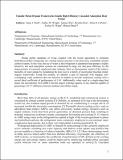Tunable Metal–Organic Frameworks Enable High-Efficiency Cascaded Adsorption Heat Pumps
Author(s)
Rieth, Adam J; Wright, Ashley M; Rao, Sameer; Kim, Hyunho; LaPotin, Alina D; Wang, Evelyn N; Dincă, Mircea; ... Show more Show less
DownloadAccepted version (2.396Mb)
Terms of use
Metadata
Show full item recordAbstract
© 2018 American Chemical Society. Rising global standards of living coupled to the recent agreement to eliminate hydrofluorocarbon refrigerants are creating intense pressure to develop more sustainable climate control systems. In this vein, the use of water as the refrigerant in adsorption heat pumps is highly attractive, but such adsorption systems are constrained to large size and poor efficiency by the characteristics of currently employed water sorbents. Here we demonstrate control of the relative humidity of water uptake by modulating the pore size in a family of isoreticular triazolate metal-organic frameworks. Using this method, we identify a pair of materials with stepped, nonoverlapping water isotherms that can function in tandem to provide continuous cooling with a record ideal coefficient of performance of 1.63. Additionally, when used in a single-stage heat pump, the microporous Ni 2 Cl 2 BBTA has the largest working capacity of any material capable of generating a 25 °C difference between ambient and chiller output.
Date issued
2018Department
Massachusetts Institute of Technology. Department of Chemistry; Massachusetts Institute of Technology. Department of Mechanical EngineeringJournal
Journal of the American Chemical Society
Publisher
American Chemical Society (ACS)